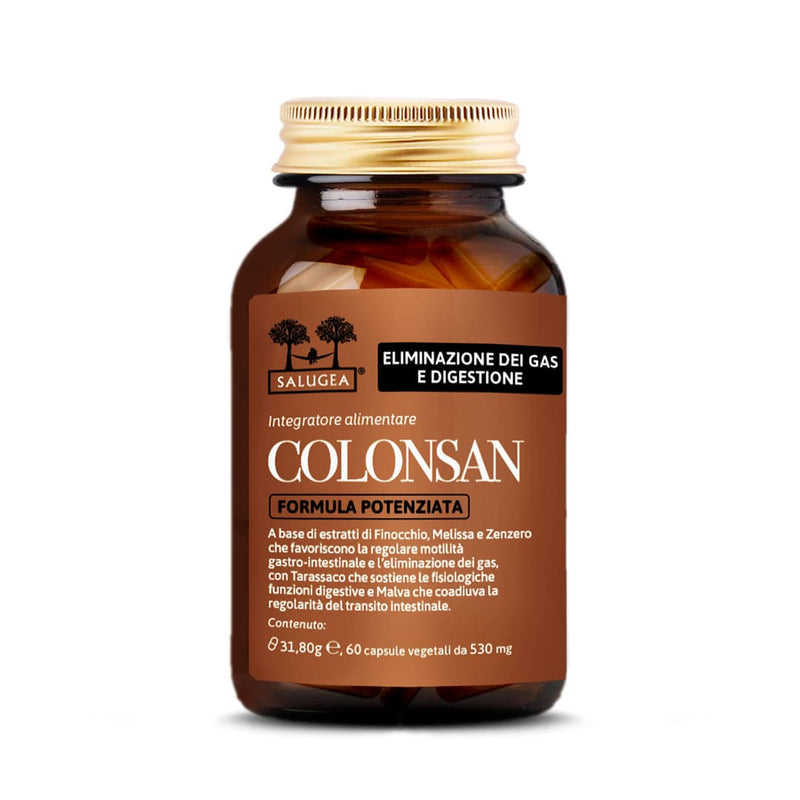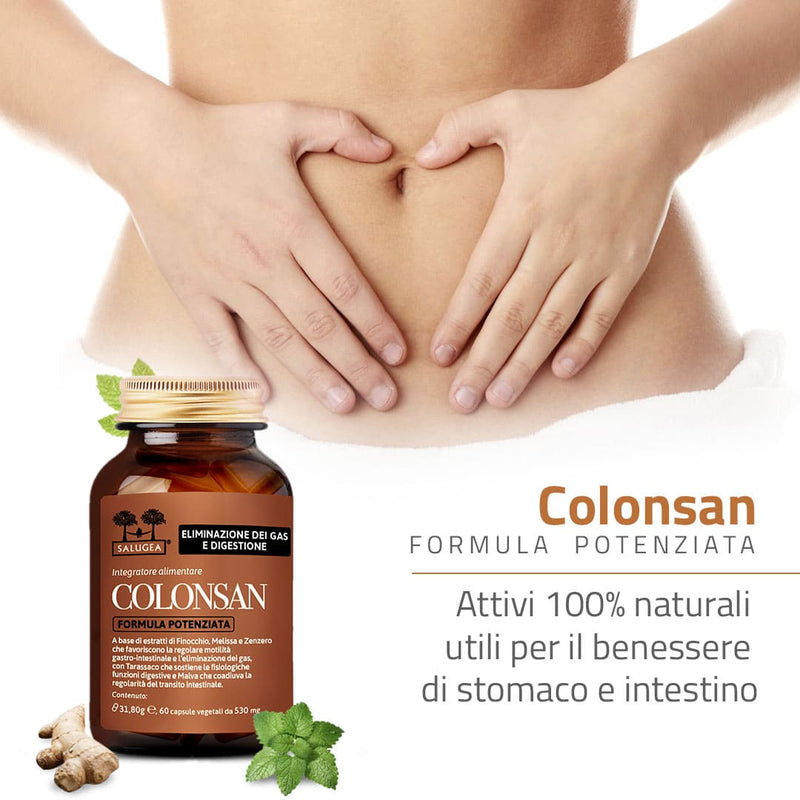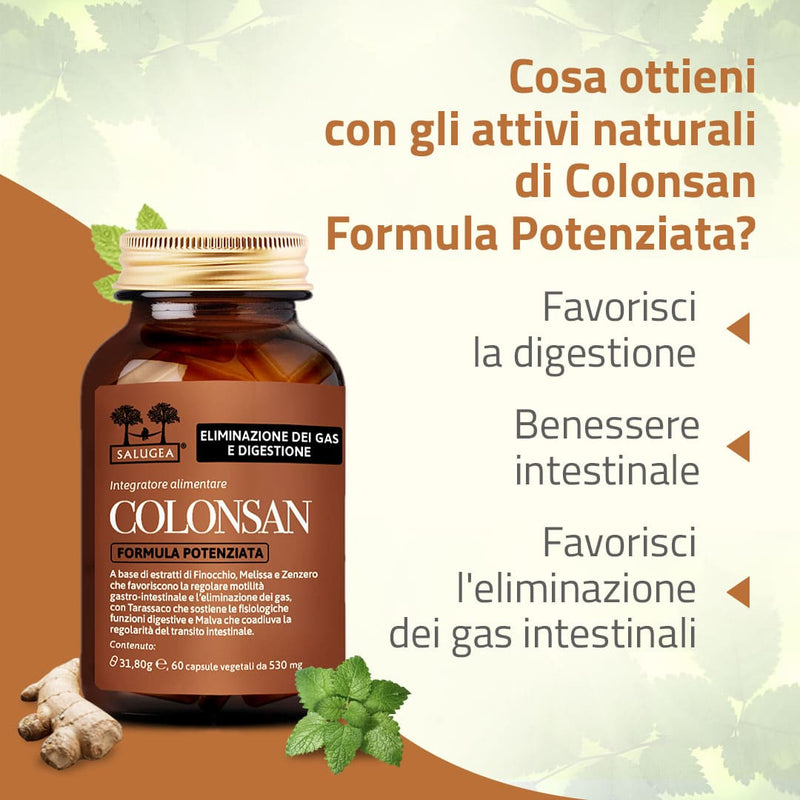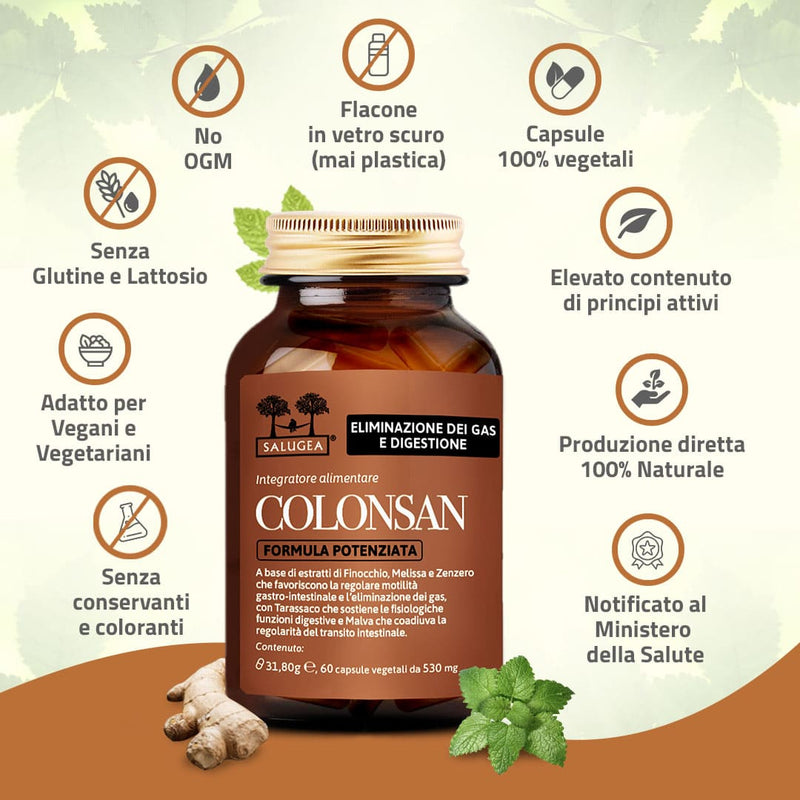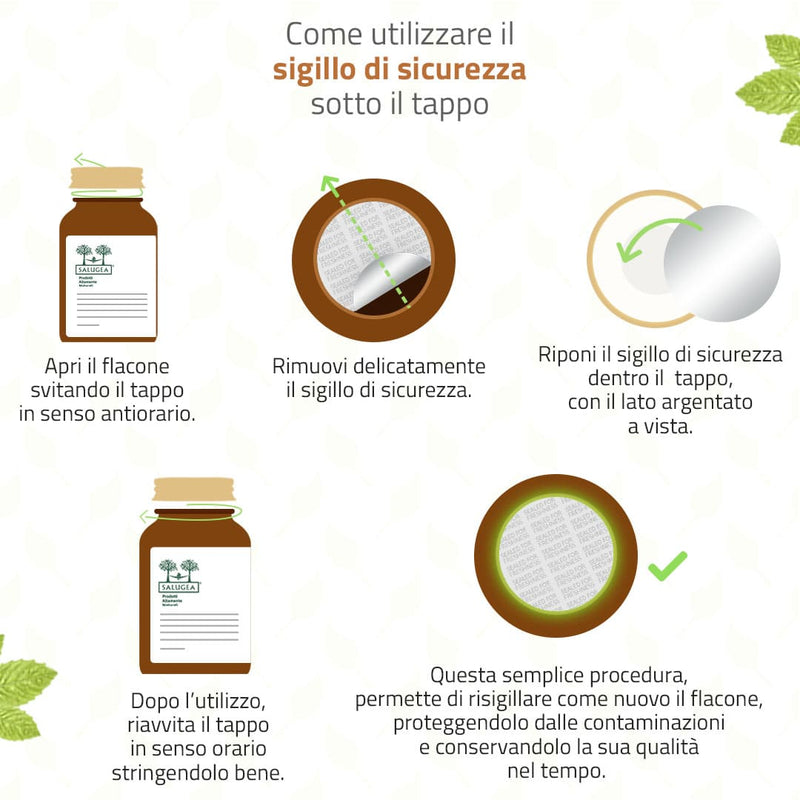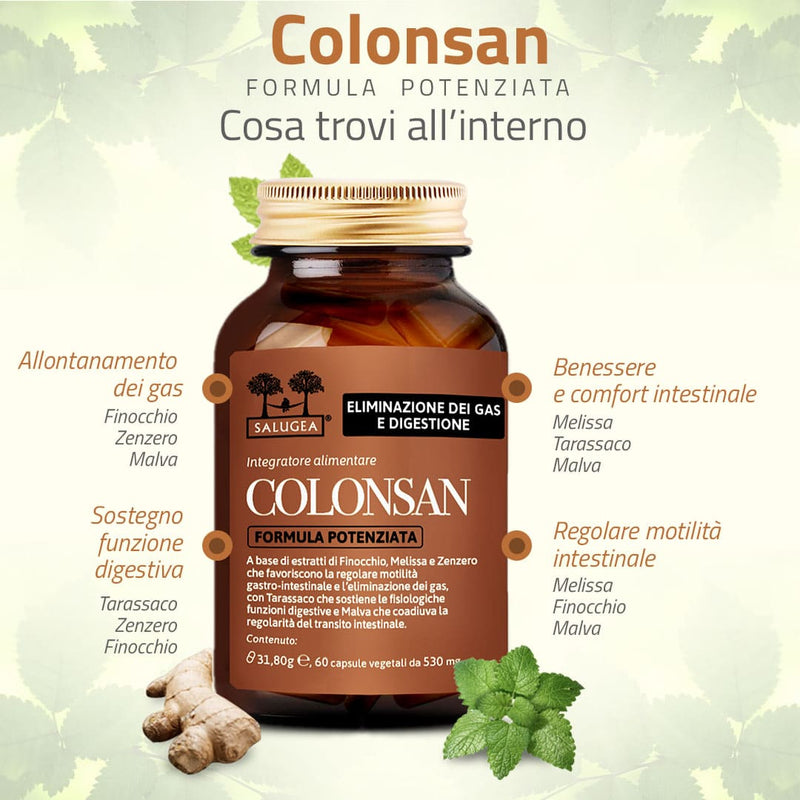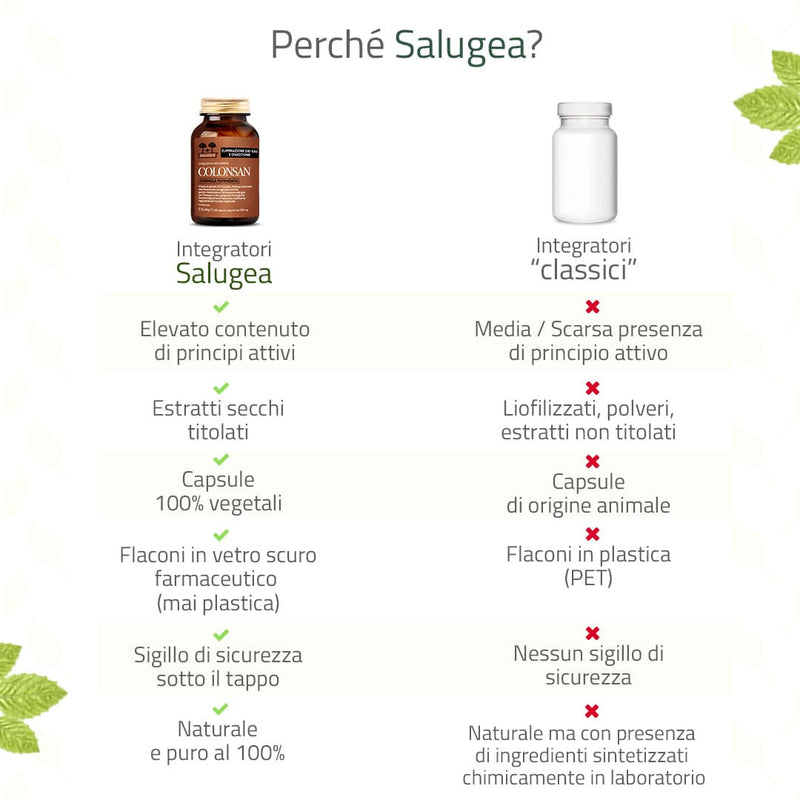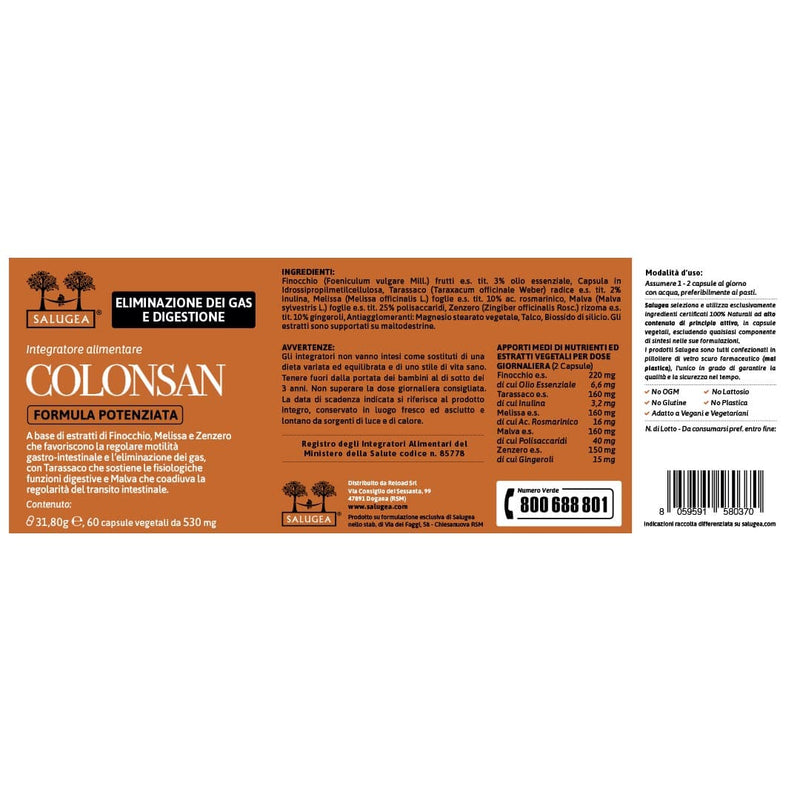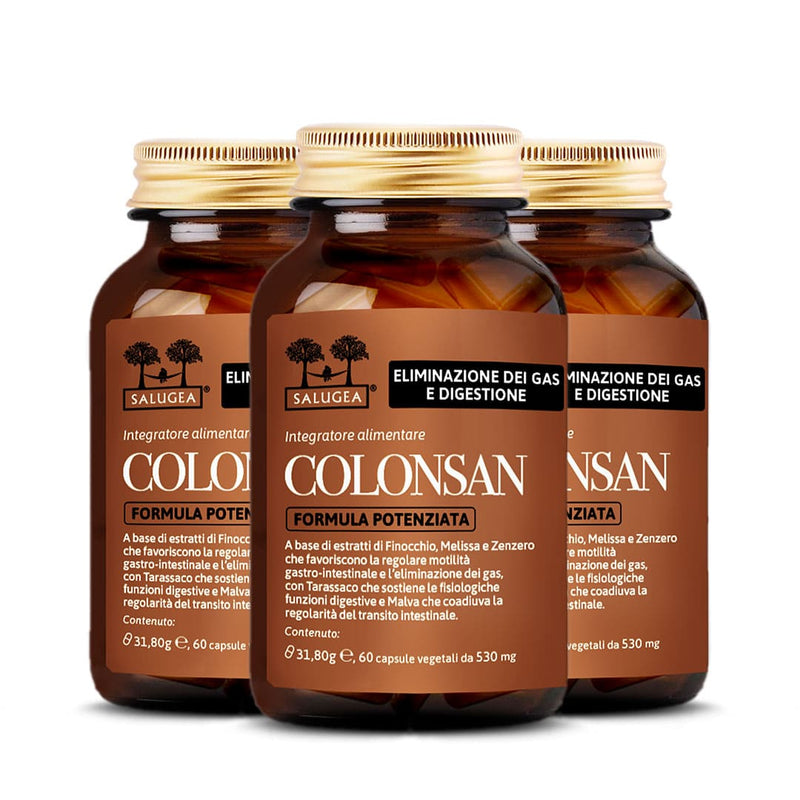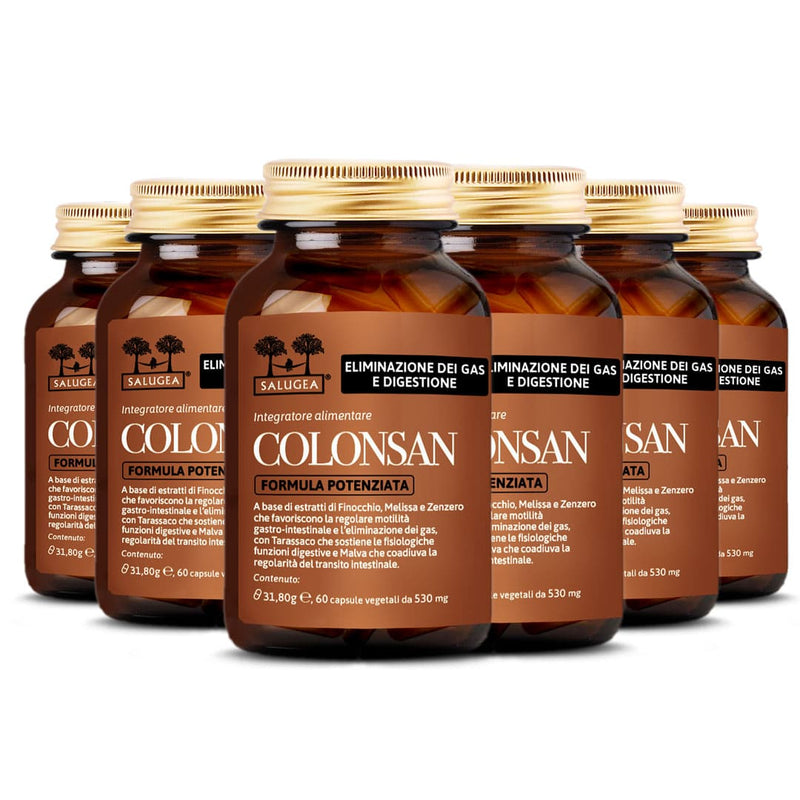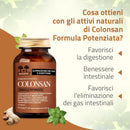- 1 - Who is it for
- 2 - How to take
- 3 - Ingredients
- 4 - Frequently Asked Questions
Food supplement to keep your stomach and intestines healthy.
Salugea Colonsan Enhanced Formula is a 100% natural supplement that supports the functions of stomach and intestines.
The secret of Colonsan Enhanced Formula lies in its formulation which is a perfectly balanced combination of Fennel, Dandelion, Lemon Balm, Mallow and Ginger.
All of them, of course, in the form of highly titrated dry extracts. Titrated dry extracts are the best source of plant active principles. In fact, the particular way the plant is processed ensures that the quantity of the plant active principles is always the same in terms of quantity and quality in each preparation, even amongst different batches.
Whom it is for
Colonsan Enhanced Formula is the supplement for women and men who wish to:
- promote the proper functioning of stomach and intestines in a natural and effective way;
- support intestinal health and modulate intestinal motility,
- promote digestion,
- help bloated intestines get rid of gas.
What you get thanks to the active ingredients contained in Colonsan Formula Potenziata
- Improved digestive process with no uncomfortable bloating or sense of fullness.
- Remove excess gas from the belly.
- Support regular bowel functions.
- Support regular gastric functions.
How Colonsan Formula Potenziata works
The strength of Biosnel Enhanced Formula lies in its formulation which is 100% natural. Each active ingredient has specific properties and all the ingredients together develop a powerful synergy. Such synergy ensures abdominal comfort, helps physiologic digestive processes and eliminates excessive gas production, hence that feeling of bloated belly.
Fennel
Thanks to the essential oils contained in its seeds, Fennel helps regulate gastrointestinal motility and promotes the elimination of gas1. It is therefore recommended in case of "bloated stomach" and to ensure regular gastrointestinal functions.
Dandelion
2The extract of Dandelion (Taraxacum officinale Weber) obtained from the plant roots, contains inulin, a natural substance that supports regular bowel motility. Bloated belly, abdominal tension and in general digestion-related discomfort are sensibly reduced. Furthermore, Dandelion possesses yet another extraordinary function. It cleanses the body, acting like a powerful detoxifying agent.
Lemon Balm
3Melissa leaves contain Rosmarinic Acid which has the capacity of modulating the contractions of the smooth muscles in the intestine walls.
Hence, the gastrointestinal motility improves together with the elimination of gas.
Mallow
Mallow main properties come from its leaves and flowers. They are both rich in "mucilage" (a thick, gluey substance) with soothing properties, especially on the intestinal mucosa4.
Mallow modulates the intestinal transit and, thanks to its beneficial action, stools have regular volume and texture.
Ginger
The main active principles of Ginger rhizome are Gingerols.
Gingerols are beneficial for the whole digestive tract. 5In particular, Ginger roots are a good help in case of digestive problems such as slow or difficult digestion and gas production. Besides, Ginger active principles are also effective against nausea.
Why is Colonsan Formula Potenziata different from other food supplements for stomach and intestines?
- It comes in pharmaceutical grade dark glass bottles. Glass is the only material that can guarantee the quality and safety of the product over time, and it is good on the environment!
- It is 100% natural.
- It is beneficial for both stomach and intestines.
- It comes in vegetable capsules that can be opened.
- It is suitable for both vegans and vegetarians.
- It is gluten free.
- It is notified to the Italian Ministry of Health.
For maximum benefits, we recommend that you take 2 capsules of Colonsan Enhanced Formula per day.
- After lunch: 1 capsule of Colonsan Enhanced Formula.
- After dinner: 1 capsule of Colonsan Enhanced Formula.
In case acute discomfort, the daily dosage can be doubled but only for 4 to 5 days.
- After lunch: 2 capsules of Colonsan Enhanced Formula.
- After dinner: 2 capsules of Colonsan Enhanced Formula.
Duration of treatment with Colonsan Formula Potenziata
After a few weeks, you will see the results and feel the benefits. We recommend that you continue the treatment for at least three months to reach the best results and keep them over time.
At the end of each month treatment, make a 2 to 3 day pause prior to start taking the capsules again. This short break will make the treatment even more effective!
At the end of the third month, according to the results you have achieved, you can move on to the maintenance phase.
Maintenance Phase
Take 1 capsule a day, preferably after lunch or dinner, or on a full stomach anyway.
If you feel like it, give us a call to share your experience with us! We care for you and would be most pleased to know how you got on with the treatment and how you feel.
Our Team of experts - Biologists and Naturopathic Doctors - will be happy to help you take the next steps to maintain over time the results you have achieved.
N.B. As we are all different (and unique!), the dosage of Colonsan Formula Potenziata can be set according to your specific needs and requirements. Just give us a call or write to us for any kind of information or advice you may need. We are at your fullest disposal ;)
Taken alone, Colonsan Enhanced Formula is extremely effective and gives you excellent results. Yet, for a stronger action and if you want to "pamper your tummy", you may want to combine it with other Salugea supplements.
- Salugea Organic Aloe Vera Juice. Made exclusively from the pulp of organic Aloe Vera fleshy leaves. The leaves of Aloe Vera contain a gel that is rich in nutrients with numerous properties. For instance, Aloe Vera active components help digestion and modulate the bowel transit. They also have emollient and soothing properties particularly beneficial to the bowel mucosa. And there is more! Aloe Vera also supports liver functions and gut cleanse.
- Salugea Organic Mangosteen Juice. Organic Garcinia mangostana fruits are simply cold-pressed. The juice obtained is 100% natural and not diluted. Garcinia mangostana has several properties. In particular, it is widely appreciated because of its active principles that help the whole digestive tract (esophagus, stomach and bowel) recover a perfectly natural balance. It tastes very nice and is a real treat for the entire digestive tract.
- Salugea Epasal. The vegetable active principles it contains allow for an effective liver cleanse. Why is liver cleanse important? The liver is one of the organs in our body that works most! To accomplish its numerous tasks, its functions must be kept in “mint” conditions!
Liver cleanse is recommended if you have been under treatment with drugs, feel under constant pressure and your diet is unbalanced. If the liver works well and does its job properly, then also stomach and intestines feel much better!
Warning
Supplements should not be used as substitutes for a healthy and balanced diet. Keep out of reach of children under 3 years of age. Do not exceed the recommended daily dosage. The best-before-date refers to the product intact and stored in a cool and dry place.
Fennel (Foeniculum vulgare Mill.) Fruits d.e. tit. 3% essential oil on maltodextrin, Capsules in Hydroxypropylmethylcellulose, Dandelion (Taraxacum officinale Weber) root d.e. tit. 2% inulin on maltodextrin, Lemon balm (Melissa officinalis L.) leaves d.e. tit. 10% rosmarinic ac. on maltodextrin, Mallow (Malva sylvestris L.) leaves d.e. tit. 25% polysaccharides on maltodextrin, Ginger (Zingiber officinalis Rosc.) Rhizome d.e. tit. 10% gingerols on maltodextrin, Anti-caking agents: vegetable magnesium stearate, talc, silicon dioxide.
Nutritional Values
|
AVERAGE NUTRITIONAL VALUES PER DAILY DOSE OF 2 CAPSULES |
|
|
Fennel d.e. |
220 mg |
|
Of which Essential oil |
6,6 mg |
|
Dandelion d.e. |
160 mg |
|
Of which Inulin |
3,2 mg |
|
Mallow d.e. |
160 mg |
|
Of which Rosmarinic acid |
16 mg |
|
Mallow d.e. . |
160 mg |
|
Of which Polysaccharides |
40 mg |
|
Ginger d.e. |
150 mg |
|
Of which Gingerols |
15 mg |
Bloating and in general digestive problems are rather common and most of them are related to the Irritable Bowel Syndrome (IBS). 6IBS affects between 15% and 20% of the population in western countries. Women in particular are subject to IBS-related disorders.
Another disorder affecting the digestive tract is the gastro-esophageal reflux. This is also very common nowadays and its main symptom is heartburn. 7In Europe gastro-esophageal reflux affects between 9 and 26% of the population. In terms of prevalence Europe ranks second immediately after North America.
8Unfortunately, gastro-esophageal reflux is one of the major health risk factors immediately after hereditary factors and obesity.
It is not surprising that the incidence of such disorders - strongly related to our lifestyle - is particularly high in Western countries. For many of us, life has become so hectic that it is virtually impossible for us to pay attention to what we eat, when and how!
9Not to mention the influence of psychogenic factors such as excessive anxiety and stress that hinder the correct digestive process. As a consequence, abdominal cramps, heartburn, bloating, nausea and diarrhea often arise.
Unfortunately, the symptoms of IBS often go underestimated and even ignored or considered as simple and temporary stomach aches. Yet, a simple stomach ache that goes on for weeks or months, cannot be considered as "normal".
10Here follows a list of the main IBS-related symptoms:
- chronic abdominal pain and cramps,
- alternating diarrhoea and constipation,
- pain relief after evacuation,
- increased pain after meals,
- change in the volume and appearance of stools,
- abdominal swelling (especially in women),
- stress,
- anxiety and / or depression.
Prevention is a key factor to avoid that initially sporadic disorders become chronic. For your intestines health it is important that you follow a balanced diet, take high quality food supplements when necessary, try to limit sources of stress and do some physical activity in a constant and adequate way.
Experimental Phytotherapy
Enhanced Colonsan Formulation formulation includes: Fennel, Dandelion, Ginger, Mallow and Lemon Balm.
Here follows a number of scientific studies on the active ingredients above.
Fennel
- Eliasvandi P, Khodaie L, Mohammad Alizadeh Charandabi S, Mirghafourvand M. Effect of an herbal capsule on chronic constipation among menopausal women: A randomized controlled clinical trial. Avicenna J Phytomed. 2019 Nov-Dec; 9 (6): 517-529. doi: 10.22038 / AJP.2019.13109. PMID: 31763211; PMCID: PMC6823525.
The 2019 study relates the effects of herbal formulations (including fennel extracts) on menopausal women with constipation problems. Compared to the placebo group, the group being treated with the herbal supplement recorded a significant improvement in constipation-related symptoms.
- Alexandrovich I, Rakovitskaya O, Kolmo E, Sidorova T, Shushunov S. The effect of fennel (Foeniculum Vulgare) seed oil emulsion in infantile colic: a randomized, placebo-controlled study. Altern Ther Health Med. 2003 Jul-Aug; 9 (4): 58-61. PMID: 12868253.
Fennel active principles have also proved to be effective in case of colitis in infants. According to a study published in 2003, remarkable improvements were recorded in a group of infants suffering from colic and treated with Fennel essential oil compared to the group treated with placebo.
Dandelion
- Martinez M, Poirrier P, Chamy R, Prüfer D, Schulze-Gronover C, Jorquera L, Ruiz G. Taraxacum officinale and related species. An ethnopharmacological review and its potential as a commercial medicinal plant. J Ethnopharmacol. 2015 Jul 1; 169: 244-62. doi: 10.1016 / j.jep.2015.03.067. Epub 2015 Apr 6. PMID: 25858507.
Dandelion (literally "Lion's tooth" from the French Dents-de-Lion) is a wild plant used for centuries in traditional medicine to provide relief from various disorders. In fact, Dandelion contains esquiterpenes, saponins, phenolic compounds, flavonoids and complex sugars.
The review analyses a collection of studies on the properties of Dandelion.
Ginger
- Semwal RB, Semwal DK, Combrinck S, Viljoen AM. Gingerols and shogaols: Important nutraceutical principles from ginger. 2015 Sep; 117: 554-568. doi: 10.1016 / j.phytochem.2015.07.012. Epub 2015 Jul 27. PMID: 26228533.
The medicinal properties of ginger - in particular against nausea, arthritis and pain in general - are due to gingerols. The analogues of gingerol are thermally labile and subject to dehydration reactions to form the corresponding shogaoli which give dried Ginger the typical pungent flavor. Both gingerols and shogaols possess antioxidant, antimicrobial, anti-inflammatory and anti-allergic properties as well as an important biological activity on the central nervous system.
The inclusion of ginger or ginger extracts in nutraceutical formulations could provide valuable protection against diabetes, heart and liver disorders.
- Lakhan SE, Ford CT, Tepper D. Zingiberaceae extracts for pain: a systematic review and meta-analysis. Nutr J. 2015 May 14; 14: 50. doi: 10.1186 / s12937-015-0038-8. PMID: 25972154; PMCID: PMC4436156.
The review takes into account several studies carried out on the analgesic properties of Zingiberacee extracts (Ginger, Turmeric, Cardamom and others). The conclusions showed that Zingiberaceae extracts are clinically effective hypoalgesic agents (i.e. have significant efficacy in reducing subjective systemic pain). Available data also show a better safety profile compared to non-steroidal anti-inflammatory drugs.
Mallow
- Gasparetto JC, Martins CA, Hayashi SS, Otuky MF, Pontarolo R. Ethnobotanical and scientific aspects of Malva sylvestris L .: a millennial herbal medicine. J Pharm Pharmacol. 2012 Feb; 64 (2): 172-89. doi: 10.1111 / j.2042-7158.2011.01383.x. Epub 2011 Nov 4. PMID: 22221093.
Malva sylvestris L., known as common mallow, is a plant native to Europe, North Africa and Asia. In the Mediterranean area, Mallow has been used for ages not only as food, but also for its therapeutic properties. Mallow leaves are reported to have a powerful anti-inflammatory and antioxidant action. They are also beneficial to the integrity of skin tissue. Recent studies confirm that Mallow also has an anti-ulcerogenic effect. Besides, its aqueous extract is more effective than cimetidine - a powerful medicine used to treat stomach ulcers. Several studies have been carried out on Mallow, given its wide use and functional importance.
Lemon Balm
- Dolatabadi F, Abdolghaffari AH, Farzaei MH, et al. The Protective Effect of Melissa officinalis in Visceral Hypersensitivity in Rat Using 2 Models of Acid-induced Colitis and Stress-induced Irritable Bowel Syndrome: A Possible Role of Nitric Oxide Pathway. J Neurogastroenterol Motil . 2018;24(3):490-501. doi: 10.5056 / jnm17035
The purpose of this study published in 2018 is to evaluate the effects of Lemon Balm (Melissa officinalis L.) on visceral hypersensitivity, defecation pattern and biochemical factors in 2 experimental models of irritable bowel syndrome (IBS) and the possible role of nitric oxide.
Results show that Melissa officinalis may improve IBS (Irritable Bowel Syndrome) by modulating visceral hypersensitivity and defecation. Lemon Balm antioxidant and anti-inflammatory properties appear to play a major role in its biological activity.
1 Badgujar SB, Patel VV, Bandivdekar AH. Foeniculum vulgare Mill: a review of its botany, phytochemistry, pharmacology, contemporary application, and toxicology. Biomed Res Int. 2014;2014:842674. doi:10.1155/2014/842674
2 Martinez M, Poirrier P, Chamy R, Prüfer D, Schulze-Gronover C, Jorquera L, Ruiz G. Taraxacum officinale and related species-An ethnopharmacological review and its potential as a commercial medicinal plant. J Ethnopharmacol. 2015 Jul 1;169:244-62. doi: 10.1016/j.jep.2015.03.067. Epub 2015 Apr 6. PMID: 25858507.
3 Noguchi-Shinohara M, Ono K, Hamaguchi T, et al. Pharmacokinetics, Safety and Tolerability of Melissa officinalis Extract which Contained Rosmarinic Acid in Healthy Individuals: A Randomized Controlled Trial. PLoS One. 2015;10(5):e0126422. Published 2015 May 15. doi:10.1371/journal.pone.0126422
4 Gasparetto JC, Martins CA, Hayashi SS, Otuky MF, Pontarolo R. Ethnobotanical and scientific aspects of Malva sylvestris L.: a millennial herbal medicine. J Pharm Pharmacol. 2012 Feb;64(2):172-89. doi: 10.1111/j.2042-7158.2011.01383.x. Epub 2011 Nov 4. PMID: 22221093.
5 Semwal RB, Semwal DK, Combrinck S, Viljoen AM. Gingerols and shogaols: Important nutraceutical principles from ginger. Phytochemistry. 2015 Sep;117:554-568. doi: 10.1016/j.phytochem.2015.07.012. Epub 2015 Jul 27. PMID: 26228533.
6 Lanng C, Mortensen D, Friis M, Wallin L, Kay L, Boesby S, Jørgensen T. Gastrointestinal dysfunction in a community sample of subjects with symptoms of irritable bowel syndrome. Digestion. 2003;67(1-2):14-9. doi: 10.1159/000069699. PMID: 12743435.
7 El-Serag HB, Sweet S, Winchester CC, Dent J. Update on the epidemiology of gastro-oesophageal reflux disease: a systematic review. Gut. 2014 Jun;63(6):871-80. doi: 10.1136/gutjnl-2012-304269. Epub 2013 Jul 13. PMID: 23853213; PMCID: PMC4046948.
8 Chang P, Friedenberg F. Obesity and GERD. Gastroenterol Clin North Am. 2014 Mar;43(1):161-73. doi: 10.1016/j.gtc.2013.11.009. Epub 2013 Dec 27. PMID: 24503366; PMCID: PMC3920303.
9 Istituto A.T. Beck - Sindrome del colon irritabile (Irritable Bowel Syndrome) - Istitutobeck.com
10 M.I.Cro Onlus - La diagnosi per la Sindrome da Intestino Irritabile - Microibd.it
I nostri testi hanno scopo divulgativo, non vanno intesi come indicazione di diagnosi e cura di stati patologici e non vogliono sostituirsi in alcun modo al parere del Medico.
Cod. Min. Sal.: 85778
I nostri testi hanno scopo divulgativo, non vanno intesi come indicazione di diagnosi e cura di stati patologici e non vogliono sostituirsi in alcun modo al parere del Medico.
Colonsan Enhanced Formula
Food supplement to keep your stomach and intestines healthy.
Domande Frequenti sull'integratore
Altre Domande?
Se non hai trovato la risposta alla tua domanda, puoi contattarci:



